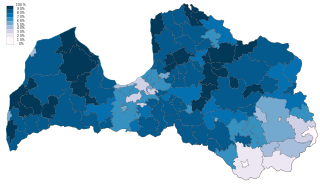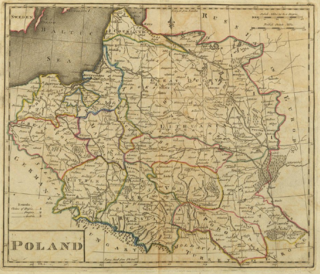
Belarus, officially the Republic of Belarus, is a landlocked country in Eastern Europe. It is bordered by Russia to the east and northeast, Ukraine to the south, Poland to the west, and Lithuania and Latvia to the northwest. Covering an area of 207,600 square kilometres (80,200 sq mi) and with a population of 9.1 million, Belarus is the 13th-largest and the 20th-most populous country in Europe. The country has a hemiboreal climate and is administratively divided into six regions. Minsk is the capital and largest city; it is administered separately as a city with special status.

A diacritic is a glyph added to a letter or to a basic glyph. The term derives from the Ancient Greek διακριτικός, from διακρίνω. The word diacritic is a noun, though it is sometimes used in an attributive sense, whereas diacritical is only an adjective. Some diacritics, such as the acute ⟨á⟩, grave ⟨à⟩, and circumflex ⟨â⟩, are often called accents. Diacritics may appear above or below a letter or in some other position such as within the letter or between two letters.

The International Phonetic Alphabet (IPA) is an alphabetic system of phonetic notation based primarily on the Latin script. It was devised by the International Phonetic Association in the late 19th century as a standardized representation of speech sounds in written form. The IPA is used by lexicographers, foreign language students and teachers, linguists, speech–language pathologists, singers, actors, constructed language creators, and translators.
The lands of Belarus during the Middle Ages became part of Kievan Rus' and were split between different principalities, including Polotsk, Turov, Vitebsk, and others. Following the Mongol invasions of the 13th century, these lands were absorbed by the Grand Duchy of Lithuania, which later was merged into the Polish–Lithuanian Commonwealth in the 16th century.

Latvian, also known as Lettish, is an East Baltic language belonging to the Indo-European language family. It belongs to the Baltic subbranch of the Balto-Slavic branch of the family and it is spoken in the Baltic region. It is the language of Latvians and the official language of Latvia as well as one of the official languages of the European Union. There are about 1.2 million native Latvian speakers in Latvia and 100,000 abroad. Altogether, 2 million, or 80% of the population of Latvia, spoke Latvian in the 2000s, before the total number of inhabitants of Latvia slipped to 1.8 million in 2022. Of those, around 1.16 million or 62% of Latvia's population used it as their primary language at home, though excluding the Latgale and Riga regions it is spoken as a native language in villages and towns by over 90% of the population.
A caron is a diacritic mark commonly placed over certain letters in the orthography of some languages to indicate a change of the related letter's pronunciation.

Ruthenian and Ruthene are exonyms of Latin origin, formerly used in Eastern and Central Europe as common ethnonyms for East Slavs, particularly during the late medieval and early modern periods. The Latin term Rutheni was used in medieval sources to describe all Eastern Slavs of the Grand Duchy of Lithuania, as an exonym for people of the former Kievan Rus', thus including ancestors of the modern Belarusians, Rusyns and Ukrainians. The use of Ruthenian and related exonyms continued through the early modern period, developing several distinctive meanings, both in terms of their regional scopes and additional religious connotations.
Ruthenian is an exonymic linguonym for a closely related group of East Slavic linguistic varieties, particularly those spoken from the 15th to 18th centuries in the Grand Duchy of Lithuania and in East Slavic regions of the Polish–Lithuanian Commonwealth. Regional distribution of those varieties, both in their literary and vernacular forms, corresponded approximately to the territories of the modern states of Belarus and Ukraine. By the end of the 18th century, they gradually diverged into regional variants, which subsequently developed into the modern Belarusian, Ukrainian, and Rusyn languages.
The voiced palatal approximant, or yod, is a type of consonant used in many spoken languages. The symbol in the International Phonetic Alphabet that represents this sound is ⟨j⟩. The equivalent X-SAMPA symbol is j, and in the Americanist phonetic notation it is ⟨y⟩. Because the English name of the letter J, jay, starts with, the approximant is sometimes instead called yod (jod), as in the phonological history terms yod-dropping and yod-coalescence.

An endonym is a common, native name for a group of people, individual person, geographical place, language or dialect, meaning that it is used inside a particular group or linguistic community to identify or designate themselves, their homeland, or their language.
Many places in Central Europe, mostly in the former German Empire and Austria-Hungary but now in non-German-speaking countries, traditionally had names in the German language. Many such names have been used for centuries by the German presence in the area dating back to Ostsiedlung, while some others were simply German transliterations of local names or names invented in the 19th and 20th centuries.
Diacritical marks of two dots¨, placed side-by-side over or under a letter, are used in a number of languages for several different purposes. The most familiar to English-language speakers are the diaeresis and the umlaut, though there are numerous others. For example, in Albanian, ë represents a schwa. Such diacritics are also sometimes used for stylistic reasons.
An English exonym is a name in the English language for a place, or occasionally other terms, which does not follow the local usage. Exonyms and endonyms are features of all languages, and other languages may have their own exonym for English endonyms, for example Llundain is the Welsh exonym for the English endonym "London".
This is a list of Lithuanian language exonyms for places outside the Republic of Lithuania.

The ethnonyms for the Poles (people) and Poland include endonyms and exonyms. Endonyms and most exonyms for Poles and Poland derive from the name of the West Slavic tribe of Polans (Polanie), while in some languages the exonyms for Poland to derive from the name of another tribe – the Lendians (Lędzianie).
The modern Welsh language contains names for many towns and other geographical features in Great Britain and elsewhere. Names for places outside of Welsh-speaking regions are exonyms, not including spelling or pronunciation adaptations and translations of common nouns.

Georgia is the Western exonym for the country in the Caucasus natively known as Sakartvelo. The Armenian exonym is Vrastan ; predominantly Muslim nations refer to it as Gurjistan or its many similar variations; while in mostly Slavic languages it is Gruziya.